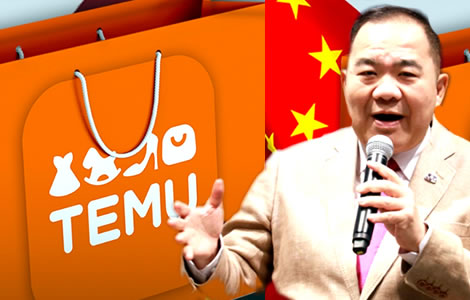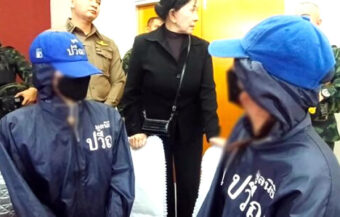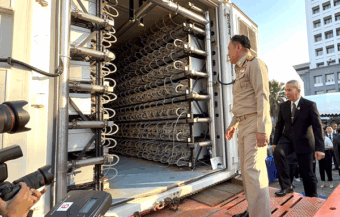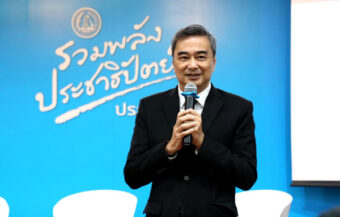Thai businesses are urging tougher action against China as dumping expands and firms are wiped out. FTI Vice Chairman warns of e-commerce giant Temu and increased competition. Industry alarm grows with declining output, more closures and insufficient protection.
The Vice Chairman of the Federation of Thai Industries (FTI) has raised the alarm about a giant online retailer launched in Thailand. The umbrella body for Thai industry is growing increasingly worried at the trend which has seen Chinese dumping of excess products into the Thai market. It is coming at a time when Thailand’s manufacturing output continues to decline over the last twenty months or so. Thai manufacturing output is falling while new business registrations are down. In response, Thailand has reinstated VAT on all imports and is deploying quality inspections. However, business leaders say it is simply not enough. In short, they are calling for more robust action against China from the government.

Thailand’s business sector is increasingly urging the government to get tougher with China. This comes as even more firms fall victim to China’s dumping policy. The concern was voiced strongly this week by the Vice Chairman of the Federation of Thai Industries (FTI), Mr. Apichit Prasoprat.
“The arrival of the new e-commerce platform will intensify competition in the Thai market as cheap Chinese imports are expected to increase,” he warned. Mr Apichit speaks for the country’s leading industry body. He told the government that Thai firms were in danger.
In summary, they were playing on an unequal playing field against subsidised Chinese behemoths.
Indeed, around the world, countries including the United States and those in the European Union bloc are ramping up trade barriers against a wave of cheaper Chinese products. In the ASEAN trade bloc, Thailand’s competitors such as Indonesia are not holding back.
Indonesia imposes high tariffs on Chinese garment imports, following significant job losses in the country
Indonesia recently raised import tariffs on Chinese garments by 200%. However, it came too late. Previously, the country had lost 49,000 jobs.
In short, the problem is multifaceted and is linked to China’s ailing economy, which has been reeling from ongoing US trade tariffs. In China, a collapsing real estate sector and nervous consumer disposition have led to a lack of demand.
Thailand is also experiencing this barrier in relation to the drive to attract Chinese tourists to the kingdom.
At the same time, a key factor is the Regional Comprehensive Economic Partnership (RCEP), which Thailand helped usher in. This trade pact between China, ASEAN, and other Indo-Pacific countries came into force in 2021 and 2022.
Pandemic and weakened China altered global supply chains, impacting ASEAN economies significantly
At the same time, this coincided with the disastrous pandemic, which permanently altered world supply chains. In turn, a weakened China is targeting ASEAN countries on two fronts.
Firstly, it is trying to keep its state-subsidised manufacturing base alive by shipping cheaper products, in short, undercutting local manufacturers and players in these markets.
Thailand moves to defend its solar energy sector from a US probe into Chinese-linked firms here
Government targets failing manufacturing base with a carbon tax on output to fight climate change crisis
Thai government urged to act to preserve the country’s auto industry which is fighting for survival
PM Srettha blames the stock market fall on politics but the trend is linked to fundamental economic decline
For instance, in the opening five months of 2024, Thailand’s steel industry has been operating at only 28% capacity. It cannot compete against cheap Chinese steel output.
This week, raising the alarm on the avalanche of cheap Chinese products, Vice Chairman of the Federation of Thai Industries (FTI) Mr Apichit warned that the number of markets challenged by China’s economic invasion has widened.
In brief, he said 30 industrial or manufacturing sectors were now challenged, up from 25.
China bypasses US trade tariffs by establishing manufacturing bases in ASEAN countries
The second way China is targeting ASEAN countries is by establishing bases here. Essentially, under the guise of manufacturing firms or new investment projects, many of these firms are elaborate efforts to bypass US trade tariffs and sanctions on the communist state.
Undoubtedly, officials are concerned that the United States may soon get tough on this policy. A precedent was recently set in relation to solar panel manufacturing owned by Chinese units in Thailand. Despite this, they were tagged with US tariffs and effectively shut down operations.
There is real apprehension that a new Trump presidency will get even tougher. At the outset, Trump is already promising a blanket 10% tariff on all imports into the United States.
The situation is increasingly alarming for the Thai government. On Thursday, Ms. Vorawan Chitarun, the Director-General of the Office of Industrial Economics (OIE), revealed that June production slipped by 1.71% compared to last year.
Thailand faces declining manufacturing output amid economic challenges and weaker spending
Previously, Thailand saw 18 months of consecutive falls in manufacturing output before a bump in April.
However, that was a short-lived improvement caused by this summer’s high temperatures. This caused a rise in demand for air conditioners and pet food.
Meanwhile, Thai consumers have seen their purchasing power diminish in 2024. An ongoing credit crunch has combined with lower earnings to reduce domestic purchasing power.
The country’s output fell again in May, surprising analysts. Now we have another decline in June, albeit not as steep as the figures seen in the first quarter.
Ms. Vorawan revealed that overall capacity utilisation in Thailand is still at only 58.41%. In brief, that was up from 57.79% in the first quarter. The first quarter saw a fall of 3.58% while the fall in the second quarter was 0.27%.
Nonetheless, this week, Mr. Apichit of the Federation of Thai Industries (FTI) has raised the alarm bell over the arrival of Chinese cutthroat online seller, Temu, to Thailand.
Temu’s arrival in Thailand highlights the challenges posed by Chinese companies and their business practices
In short, this is a Chinese company whose suppliers stormed the its headquarters in China this week over non-payment. For instance, the firm is employing a system similar to the social credit score on entrepreneurs, essentially penalising them for poor customer service or delivery problems.
The sanctions include late payments of monies due to the suppliers.
Temu quietly launched its operation in Thailand on July 29th. It promises discounts of up to 90% off prices.
Meanwhile, the Thai government has responded by reinstating VAT on all imports over ฿1,500 from July 5th. In addition, this week the Minister of Industry, Pimpatra Wichaikul, has deployed the Thai Industrial Standards Institute (TISI) to monitor incoming imports.
Certainly, the business sector no longer considers such moves robust enough to deal with the scale of the threat. In addition, this is a fast-moving situation.
Thai government policies and RCEP implementation contribute to economic challenges and business closures
In some ways, Thai government policy has contributed to this emerging debacle. The gung-ho implementation of the Regional Comprehensive Economic Partnership (RCEP), the emphasis on moving Thai consumers into the digital sphere and concessions made to Chinese firms relocating to the kingdom.
Figures for June show the number of new Thai companies registered decreased by 3.61%. 7,351 new companies were established. Most of these were in real estate, construction and hospitality. Meanwhile, 1,416 business concerns closed. Notably, this is 14.65% less than last year. Yet, manufacturing output continues to decline.
Critically, this problem is not just impacting Thailand. Nonetheless, Thailand, because of its proximity to China, its attractive consumer market, and Chinese links, is a prime target for this Chinese wave of economic invasion.
A report published this week by HSBC Bank economists has warned ASEAN countries that in the course of just three years, the trade deficit with China has spiralled out of control.
“In ASEAN, the deficit has been increasing continuously since the COVID-19 period, which was around $80 billion. Now, the deficit is likely to be around $115 billion,” it read.
Trade deficits with China soar in ASEAN countries, urging shift to wealthier US market for exports
In summary, imports from China to ASEAN countries have surged while exports to China have been kept at bay.
Even this week, the Thai Ministry of Commerce urged Thai firms to begin to focus on the wealthier US market for future export sales.
In many ways, it makes grim reading. Anything short of an economic wall against Chinese imports, it is suggested, will not be enough to save small and medium-sized factories and producers in Southeast Asian nations.
The reason for this is that with government subsidies in China, its producers benefit from cheaper electricity in addition to lower wages compared to Thailand. However, the massive economies of scale, given the size of Chinese manufacturers, mean small manufacturers are priced out of the market.
Thailand’s economic base weakened by competition with Chinese manufacturers and the looming EV crisis
From Thai steel firms, which cannot compete while China is promising to launch huge new facilities in the kingdom, to small consumer items, the hollowing out of Thailand’s economic base has begun.
On one hand, a small cover for a smartphone can be produced and sold for ฿50 when it comes from China. A Thai producer would likely have to charge ฿500.
Thailand changes tack as the EV revolution turns into a damp squib with warehouses full of unsold cars.
On the other hand, the looming crisis in the automotive sector is another case in point. This week a Chinese EV car manufacturer launched a family saloon for ฿399,000 new. The sales of EV cars in Thailand in the first six months amounted to only 39,648 units.
At the same time, the EV association’s data shows that there are 430,000 imported EV cars, mostly from China, in storage.
Furthermore, the Thai government is paying a subsidy of up to ฿100,000 to ฿150,000 for the sale of these cars. This is under the much vaunted EV 3.5 scheme.
Clearly, these are directly displacing Thai jobs in the traditional ICE (Internal Combustion Engine) sector, which has seen output down by approximately 20% so far this year.
In short, the government has been responding, but the speed at which this movement is occurring now calls for drastic action. It is time to get tough with China before even further damage is done.
Join the Thai News forum, follow Thai Examiner on Facebook here
Receive all our stories as they come out on Telegram here
Follow Thai Examiner here
Further reading:
Lack of coherence in government policy is the root cause of Thailand’s massive economic problems
Disturbing questions that must be confronted over Thailand’s reeling economy are China and EV cars
First-quarter GDP growth surprises analysts based on higher tourism and consumer spending growth
Central bank holds interest rates. Economy will grow 2.6% in 2024 as Srettha pushes home ownership
Economy unlikely to grow in first quarter as Thai manufacturing crumbles. Hard choices ahead
New Finance Minister expected in April as economic malaise deepens with downgrades in GDP growth


















